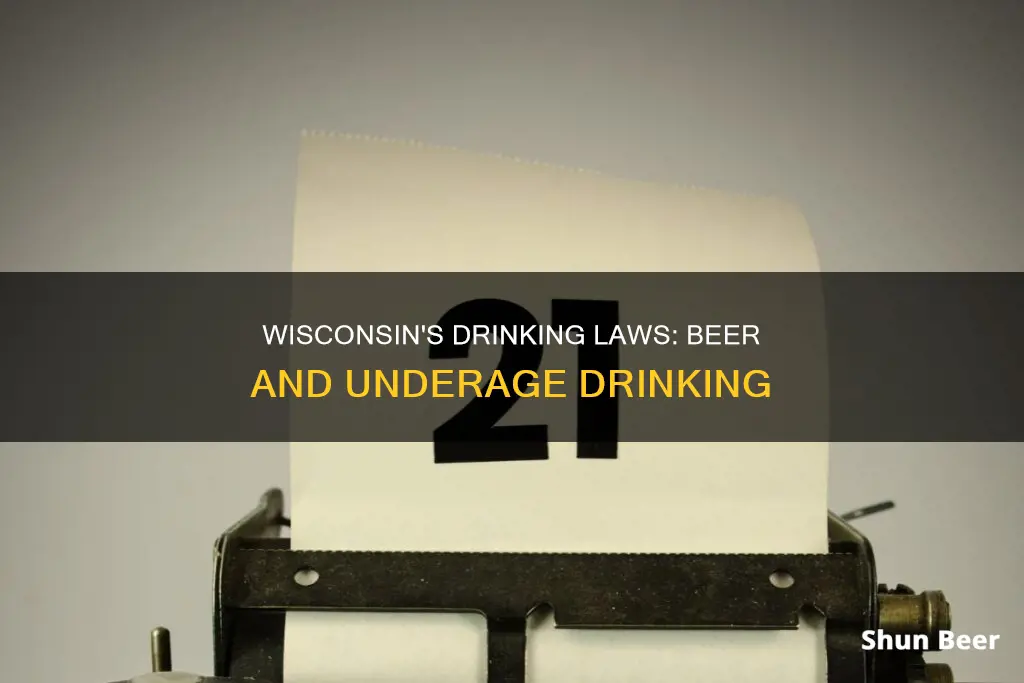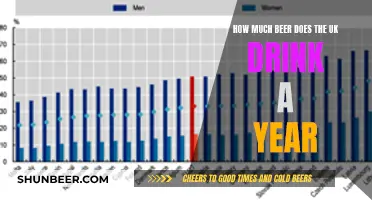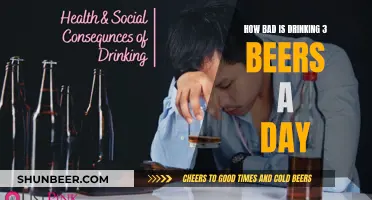
The drinking laws in Wisconsin state that the legal drinking age is 21 years old. However, there are certain exceptions to this rule. For example, individuals under 21 are allowed to consume alcohol as long as they are accompanied by a parent, guardian, or spouse who is of legal drinking age. This law applies to individuals under 18 as well, and the location can be a restaurant, bar, or private home. It is important to note that the owner of the establishment has the discretion to allow or deny the consumption of alcohol to minors. Additionally, those aged 18 to 20 may possess alcohol for work purposes but are not permitted to consume it.
| Characteristics | Values |
|---|---|
| Legal drinking age in Wisconsin | 21 years old |
| Minors drinking with parents | Allowed, as long as it is on private, non-alcohol-selling premises and the minor is under parental supervision |
| Minors drinking in licensed premises | Allowed, as long as they are accompanied by a parent, guardian, or spouse of legal drinking age and the license holder does not object |
| Minors drinking in public premises | Allowed, as long as they are accompanied by a parent, guardian, or spouse of legal drinking age |
| Minors drinking and driving | Prohibited; minors must be completely sober when operating a vehicle |
| Minors working in places serving alcohol | Allowed, but they cannot sell, dispense, serve, or give away alcohol unless they are 18 or older |
What You'll Learn

Drinking with parents/guardians
In Wisconsin, the legal drinking age is 21. However, there is an exception to this rule that allows minors to drink with their parents, legal guardians, or spouses who are of legal drinking age. This law applies to minors under 21, including 18, 19, and 20-year-olds, and there is no minimum age specified for drinking with a parent or guardian.
The law states that minors can only drink with their parents or guardians on private, non-alcohol-selling premises. This means that public premises such as bars, taverns, and liquor stores are exempt from this exception and are not required to serve minors, even if they are accompanied by a parent or guardian. The decision to serve alcohol to minors in these establishments is at the discretion of the owner or licensee, who may choose to refuse service to avoid potential liability issues.
While it is legal for minors to drink with their parents or guardians in Wisconsin, it is important to note that this does not permit unlimited or unsupervised drinking. The accompanying adult must exercise good judgment to ensure the minor does not consume excessive alcohol. Additionally, minors must be completely sober when operating a vehicle, regardless of their age or who they are with, according to Wisconsin's Absolute Sobriety Law.
The penalties for violating drinking laws in Wisconsin vary depending on the specific law being violated and the circumstances. Possessing or consuming alcohol as a minor can result in fines, license suspension, community service, and/or participation in educational or treatment programs. It is important to note that these penalties can increase for multiple violations within the same year.
Beer Collectables: A Guide to Their Functionality and Value
You may want to see also

Drinking at 18 in bars/restaurants
In Wisconsin, the legal drinking age is 21. However, there is an exception to this rule that allows those under 21 to drink in bars and restaurants if they are accompanied by their parents, guardians, or spouses of legal drinking age. This exception applies to 18-year-olds, who are considered adults in Wisconsin. While it is legal for 18-year-olds to drink in these establishments with their parents or guardians, the specific laws regarding this are complex and often confusing.
The Wisconsin Department of Revenue states that persons under 21 may possess and consume alcohol if they are with their parents, guardians, or spouses of legal drinking age. However, this is at the discretion of the licensee, meaning that bar and restaurant owners can refuse to serve those under 21 if they choose to. This is due to liability concerns, as owners have no control over what a minor will do after leaving the establishment.
While it may be legal in Wisconsin for 18-year-olds to drink with their parents or guardians in bars and restaurants, it is not always safe. The Centers for Disease Control and Prevention (CDC) warns that underage drinking can lead to changes in brain development, drug abuse, and other problems. In addition, anyone under 21 in Wisconsin must be completely sober before driving, according to the state's Absolute Sobriety Law. This means that even if an 18-year-old legally consumes alcohol with their parent or guardian, they cannot drive until they are totally sober, which could take several hours.
The laws regarding drinking in Wisconsin have a long and complex history. When Wisconsin became a state, settlers from the eastern United States took issue with the consumption of alcohol by German immigrants on Sundays. Over time, various laws were passed to restrict alcohol sales and consumption, including the Graham Law in 1872, which prohibited the sale of alcohol to minors. In the early 1970s, the drinking age in Wisconsin was lowered to 18, but it was raised again to 19 in 1984 and then to 21 in 1986.
While the legal drinking age in Wisconsin is 21, the exception allowing 18-year-olds to drink in bars and restaurants with their parents or guardians provides a way for younger people to legally consume alcohol in certain situations. However, it is important to be aware of the potential risks and consequences of underage drinking and to drink responsibly and in moderation.
Boston Beer Works: Logan Airport Location Guide
You may want to see also

Drinking and driving laws
In the state of Wisconsin, US, the legal drinking age is 21. However, those under 21 are permitted to consume alcohol in licensed establishments if they are accompanied by a parent, guardian, or spouse who is of legal drinking age. Additionally, 18- to 20-year-olds may possess (but not consume) alcohol as part of their employment.
Despite the existence of these exceptions, drinking and driving laws in Wisconsin are stringent. Driving under the influence (DUI), also known as operating while intoxicated (OWI), can result in severe consequences. An individual is considered to be operating under the influence if their blood alcohol concentration (BAC) is 0.08% or higher, or if their driving is observed to be impaired as a result of ingesting controlled substances.
The penalties for OWI in Wisconsin increase with the number of offenses. For a first offense, there is typically no jail time unless a minor under 16 is in the vehicle or someone is injured. However, there is a fine ranging from $150 to $300, a six- to nine-month license revocation, and a mandatory alcohol assessment. For a second offense, the penalties include a fine of $350 to $1,100, a mandatory five days to six months in jail, a 12- to 18-month license revocation, and a mandatory alcohol assessment. Third and subsequent offenses carry even harsher penalties, with the possibility of permanent license revocation and lengthy jail sentences.
Wisconsin has no minimum required jail sentence for an individual's first or second offense of driving under the influence. The financial penalty for both the first and second offense ranges from $150 to $300. The penalty for a third offense is a confinement sentence of 45 days to one year and a financial penalty of $600 to $2,000. For a fourth offense, the fine increases to $600 to $10,000, with a jail sentence of 60 days to six years, and the license can be revoked for life if the offense occurs within 15 years of the third offense.
It is important to note that the repercussions of an OWI conviction can vary from one county to another in Wisconsin, and it is crucial to seek legal representation to understand the specific laws and consequences.
Beer for Slugs: Does It Work?
You may want to see also

Selling alcohol at 18
In Wisconsin, the drinking age is 21. However, those under 21 may be served, possess, or consume alcohol if they are with a parent, guardian, or spouse who is of legal drinking age.
In terms of selling alcohol, the laws vary depending on the type of alcohol and the location of the sale. For example, in Wisconsin, only those 18 and older are able to serve alcohol in bars and restaurants. Additionally, those aged 18 to 20 may possess (but not consume) alcohol as part of their employment.
When it comes to selling alcohol in stores for off-site consumption, the laws differ by state. In some states, such as Wisconsin, there is no minimum age to sell beer or wine for off-site consumption, but a person must be at least 21 to sell spirits. In other states, such as California, any adult who gives alcohol to someone under 21 can be charged with a misdemeanor.
It's important to note that the laws around selling alcohol can be complex and may vary by jurisdiction. For example, localities may have higher restrictions than state laws. Additionally, some states may require a supervisor of a certain age to be present during alcohol sales. Therefore, it's always wise to check the local laws and regulations to ensure compliance.
Beer and Cholesterol: Drinking Before a Test
You may want to see also

Drinking in private homes
In Wisconsin, the legal drinking age is 21. However, there are exceptions to this rule that allow those under 21 to drink in certain situations.
In Wisconsin, those under the legal drinking age of 21 are allowed to consume alcohol in private homes as long as they are accompanied by a parent, legal guardian, or spouse of legal drinking age. This is known as the "Wisconsin drinking with parents law". The alcohol must be provided by the parent, guardian, or spouse, and the consumption must take place on private, non-alcohol-selling premises. This means that the minor cannot drink in public places such as bars, taverns, or liquor stores.
It is important to note that the "Wisconsin drinking with parents law" does not permit unlimited or unsupervised drinking by minors. The accompanying adult must exercise good judgment to ensure the minor does not consume excessive alcohol. The law does not specify a minimum age for drinking with a parent or guardian, so it applies to individuals under 18 as well.
While Wisconsin allows minors to drink in private homes with parental consent, it is not a widely promoted or well-known policy. Ultimately, it is up to the discretion of the establishment owner or license holder to allow or deny the consumption of alcohol by minors, even if they are accompanied by a parent or guardian. This is due to concerns about liability, as the owner has no control over the minor's behaviour after they leave the premises.
The "Wisconsin drinking with parents law" has been a topic of discussion for lawmakers, with some attempting to modify the law to reduce drinking among minors. For example, former State Senator Judy Robson of Beloit authored a bill to set a minimum age limit of 18 for minors to drink with a parent or guardian in bars and restaurants, but it was never given a vote.
It is worth noting that Wisconsin's Absolute Sobriety Law states that minors must be completely sober when operating a vehicle, regardless of their age or who they are with.
Shout Stain Remover: Beer Stain Solution?
You may want to see also
Frequently asked questions
The drinking age in Wisconsin is 21. However, those under 21 are allowed to consume alcohol as long as they are accompanied by a parent, guardian, or spouse of legal drinking age.
Individuals under 21 are allowed to drink alcohol in the presence of a parent, guardian, or spouse of legal drinking age in restaurants, bars, and private homes.
The penalties for drinking as a minor in Wisconsin include fines, license suspension, community service, and/or participation in educational or treatment programs.







